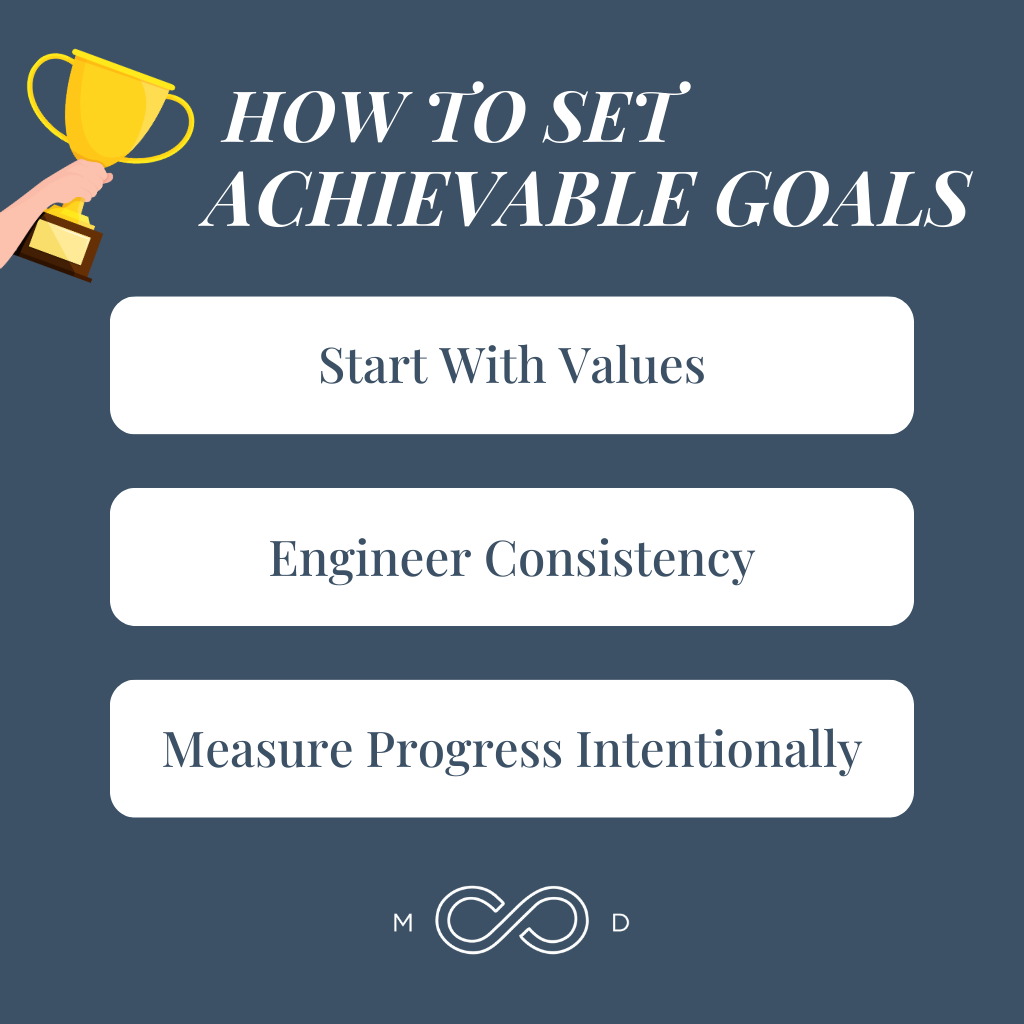Download file | Play in new window | |
Nearly everyone practices a little goal-setting in January.
The new year is a reasonable time to reflect on the past and set new goals for the future. Yet it’s practically a proverb that these resolutions don’t last past the first month or two as we fall back into old patterns.
Why is that? Is it a lack of motivation? Of discipline? What’s the solution?
The answer may surprise you.
Start With Values
In my experience, the root of many failed resolutions — regardless of the time of year — lies in our values. More specifically, it lies in not clearly identifying what matters most in our lives.
Without clarity on our values, many of us simply choose the wrong goals. We set resolutions because we think we should, not because they reflect what matters most.
In my life, I find it helpful to go to my future self. When I look back in five, 10, or 20 years, how will I measure success in my life? My answers clarify what I value most and illuminate the goals I must set today if I want to achieve a successful life through these measures.
For example, one of my core values is modeling resilience and perseverance for my kids. I want them to see me showing up day after day to put in the work on my biggest dreams. That future vision guides my actions, like waking up early to work out, even when I’m tired. My family legacy matters more to me than momentary discomforts.
Jen, our incredible nurse practitioner, uses a similar technique for her health goals. She asks herself, “What do I want this year?” Then she sets a goal in line with that value. This motivation has helped her develop and stick with habits like “Never skip twice,” which have helped her stay on track and make immense progress.
Imagining your ideal future self is a powerful way to begin goal-setting. Who do you want to be? When you know the answer, you can ask the practical follow-ups: How would that person eat, sleep, move, love, take risks, and behave? You begin adopting the behaviors of that ideal self to be that ideal self.
However, without an exercise that helps you clarify your highest values, you run a greater risk of setting goals that are either inconsequential in the long term or satisfy someone else’s desires.
Engineer Consistency
Discipline and goal-setting go hand in hand. But I used to equate discipline with sheer willpower — forcing myself to follow through on goals with self-control alone. But this understanding sets us up for failure. As James Clear rightly notes in his book Atomic Habits, relying solely on willpower is unsustainable.
The most disciplined people I know don’t have a superhuman amount of willpower. Rather, they architect their lives to conserve willpower. They create environments that make positive habits easier and negative habits harder, keeping them on track toward the goals that matter to them.
What this really boils down to is consistency. It’s doing the same boring thing day in and day out. And that means architecting an ecosystem where the path of least resistance is the path that leads you to your goal.
For example, Jen’s mom recently visited and was surprised to find no snacks lying around the house. Jen structured her home to remove temptation, saving willpower for when it’s needed most.
Similarly, I’m a bit of a sucker for cookies. So why aren’t I suffering the consequences of cookie overload? To conserve my willpower, I’ve architected a world where cookies aren’t regularly in front of me.
Otherwise, I’d either eat them or I’d exhaust all my willpower not eating them. That would leave me vulnerable in other areas where I need my willpower to function.
Too often, we set ambitious goals without adjusting our surroundings to match. We continue living among distractions, temptations, and routines that contradict what we’re trying to achieve. It’s no wonder we struggle to follow through when we’re constantly swimming against the tide!
Nick Saban, championship football coach, summed it up perfectly: “If you can handle the pain of discipline, then you’ll never have to deal with the pain of disappointment.”
Measure Progress Intentionally
As human beings, we need to notice progress toward our goals, or we lose the motivation we need to stay consistent and disciplined.
I’ve shared before about my mentor Dan Sullivan’s concept of the Gap and the Gain, and the principle applies perfectly here. The principle involves a simple mental shift in self-evaluation, yet it’s revolutionary for keeping you motivated and encouraged:
- Measure your progress based on how far you’ve come, not on how far you have left to go.
What does this mean? First, it means that as important as getting clarity on your end goals is, obsessing over an ambitious future self can backfire. Your ideal self is just that: an ideal. It’s an ever-distant horizon toward which you can chart your course but never reach. And you’re not meant to.
If you measure your progress against the future — whether that’s an ideal future self or a finite, attainable goal — no progress is adequate unless you attain that end. Every achievement or milestone carries with it a discouraging caveat. If your goal is to lose 100 lbs. and you lose 87, you don’t celebrate the 87; you lament the missing 13.
It’s a recipe for perpetual dissatisfaction.
Whether we’re talking about health goals, relationship goals, financial goals, or professional goals, there’s so much power in measuring backward — against where you started. You’re able to see your progress and celebrate even small wins, adding to your tailwind. You focus on your trajectory of improvement, and you’re motivated to keep advancing.
The horizon is useful. It’s directionally accurate, and it tells us where to point our engines. But as we begin the journey of day-to-day consistency to develop discipline, we have to look back at where we started.
Of course, to accurately assess your progress, you have to start with your baseline data. Identify the key metrics you want to influence for your goal. For health and fitness, it may be weight, body fat percentage, strength, endurance, or cholesterol levels. For finances, it might be savings, investment balances, or debt repayment.
The numbers aren’t perfect representations of the qualitative changes you’re aiming for, but they provide a reference point for measuring backward.

Illuminate Your Blind Spots
One uniquely challenging element of the journey toward your goals is the emotional work involved. Progress requires truth-telling — taking an honest look at what habits and environments currently sustain you and which hold you back.
For many, becoming a better truth-teller might be goal #1. There’s freedom in being able to tell the truth, even about things you’re not proud of.
But the truth can be painful. Scary. Ill-defined. Elusive. We may bury parts of that reality because it’s uncomfortable to look at them. This is where inviting (trusted) outside perspectives can make an enormous difference.
We all have blind spots, which is why working with a coach, mentor, or accountability partner can be so helpful. Their job is to illuminate hidden limitations with empathy, to compassionately confront places where your behaviors don’t match the goals you’ve shared.
The Road Ahead
As you set new goals this year, remember that it’s not about being perfect; it’s about being consistent and true to your values.
What first step can you take today? How will you begin restructuring your environment and habits to conserve willpower? I’m cheering you on as you progress down your unique path. You’ve got this!

Dr. Aaron Wenzel is a concierge physician specializing in the care of fast-moving entrepreneurs, executives, and public figures in the Nashville, TN area. Dr. Wenzel’s diverse life experience and extensive training in family medicine, emergency care, nutrition, and hormone replacement therapies give him the unique platform to provide unmatched care for his patients.






